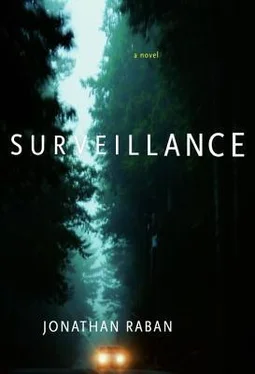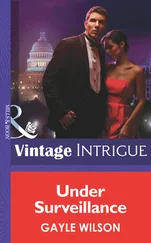“Why did he have to pick me? I must be nearly twice his fucking age!”
“Well, along with all your other charms, he wants your citizenship.”
“What d’you mean?”
He told her about the Office of Vital Statistics, the call from the bank, the stolen Social Security number.
“Well, aren’t you the clever gumshoe? What are you going to do, then, turn him over to the INS?”
“Have you ever seen the INS jail down by Union Station? They’ve got hundreds of Hispanics locked up in there. You see them standing at the bars like animals in cages, crying, yelling out messages to friends and relatives. Every time I go past, my blood ices up. I hate the INS. I hate the INS more than I hate Lee, even more than I hate the fucking FBI. For pure, cold, bureaucratic cruelty, I’d give the INS a perfect ten. So no, not yet, not now, and if and when I do, I’ll hate myself even more than I hate the INS.”
“I don’t see the use of knowing he’s an illegal unless we can get him deported.”
“Try thinking like your new pal Kissinger. Lee’s got the bomb and we’ve got the bomb: mutual deterrence, mutually assured destruction. Détente. I kind of like the idea of playing Henry — Iago with a funny accent.”
Later, he told her, “I copied everything and put the papers in my bank, so you’ll know where they are. Just in case.”
She said, “I don’t see how we can go on living here, not after what happened.”
“So maybe we move out. But if we move, we move on our terms, not his.”
When she said we she meant Alida and herself; when he said we he meant the three of them — the family. Lucy was surprised by the comfort she took from that.
FINN, back in school, looked strangely older, paler, and even, Alida thought, a little thinner, though his smirk was permanently in place. His home PC had been confiscated, and he was forbidden access to the computer lab. The boys mobbed him with questions.
“The FBI don’t do juveniles,” Finn said, in the new vocabulary he’d acquired over the last two days. “It’s like federal law. They’re gonna send my papers to the state prosecutor. Guy’ll read ’em and see if he’s got a case.” He saw Alida on the outskirts of the group. “Who you staring at, dude?”
Even the teachers seemed in awe of his fame. There was no “Wake up, Finn!” or “Let’s hear from Finn — just this once.” Alida’s mom had shown her a whole article about Finn — again, he was disappointingly unnamed — in The New York Times that began right at the top of the front page: “11-Year-Old Hacker Has Experts Puzzled.” At morning assembly, the principal had warned the entire student body not to speak to reporters. Two policemen now stood outside to shoo away the TV vans that had tried to merge with the parents’ SUVs as they waited in line to drop kids off.
By the afternoon, Finn mania had begun to subside, and even Social Studies was interesting. Peter Puget had mapped exactly where he was on the Earth’s surface by using a sextant — Mrs. Milliband had brought one into the classroom — to measure the angle of the sun from where he stood on the Olympic Peninsula. He’d used a tray of reflective mercury as an “artificial horizon.” Alida couldn’t wait to get her hands on the sextant, which looked way cool with its swinging arm, its hinged mirrors, its protractor and micrometer. Listening to Mrs. Milliband talk, she thought navigation might turn out to be right up there with algebra.
“My husband’s a big sailor. One of the first things he taught me when we went sailing — this was back in the 1960s — was how to use a sextant.”
Which meant that Mrs. Milliband must be over sixty years old. Maybe seventy, even. Cripes! As old as Augie, or almost.
AT USELESS BAY, the weather — light showers and heavy overcast — was almost suspiciously normal for mid-April, coming as it did after the succession of heat waves and floods. It was how Lucy remembered springtime in the 1990s. She even liked keeping the top up on the Spider. Adose of normality was what she craved, and badly needed in order to handle this trickiest of weekends with Augie.
At dinner — a rich and winey boeuf à la bourguignonne that nicely fit the fifty-degree temperature outside — it was Augie who brought up the Freak virus.
“This kid—”
“He’s in my class, and his name’s Finn.”
“Really? Wow. So you’re on first-name terms with the infamous terrorist?”
Lucy said, “I think ‘terrorist’—”
“It goes back to what we were saying about infrastructure a couple of weeks ago.”
“Imagine, eleven!” Minna said to Lucy.
“Your friend Finn, it’s just a hop and a skip from doing what he did to crippling the country’s entire financial infrastructure. A sixth-grader! No offense, Alida, but if a sixth-grader can manage that, imagine what a bunch of determined Islamists could do. They’ve got college degrees from our own universities — Ph.D.s, a lot of them. They’re biochemists, physicists, computer engineers, you name it. They’re not peasants from the desert, but well-off professionals in their fields. They’ve got all Finn’s considerable skills and a whole lot more.”
“What are Islamists?”
“It’s a long story that I’ll tell you when we’re kayaking, if you like. For now, just think of them as men made mad by weird beliefs in a warrior god. Fanatics who hate America.”
“Okay.”
Lucy thought this rather less than okay, and had no desire to see Alida return from her kayaking trip converted to Augie’s peculiar brand of neoconservatism.
“Fact is, Finn deserves a medal for exposing how open to attack we are. I just pray we’re capable of learning our lesson from this, though I wouldn’t put a five-spot on that one. You think Internet Explorer’s vulnerable? You better think about the water supply, the electrical grid, the railroad system. And all I see is a lot of people who ought to know better blowing smoke up our collective hiney.”
“Augie!” Minna made a face at him across the table.
“My educated guess is that Alida’s perfectly familiar with the word ‘hiney.’”
Alida laughed. “I never heard that one, though, about blowing smoke up it.”
“It’s not a bad expression to learn. Most of politics consists of blowing smoke up people’s hineys.”
Over dessert — a chocolate and orange mousse, for which Augie brought out a bottle of Muscat de Beaumes de Venise — Lucy steered the talk around to Boy 381, the movie.
“They say it’s still in preproduction, whatever that means. I take no interest in it: my attitude to that deal was to grab the moolah and run straight to the bank. They bought it, so it’s their story now. They can turn it into fiction, which is all the movie’ll ever be. I’ll read a junk thriller on a plane once in a while, but I’ve never really cared for fiction.”
“You mean they’re turning your book into like a Hollywood movie?”
“You have to read it, Rabbit. It’s a bit like Anne Frank’s diary, about Augie as a boy, growing up in World War II. As soon as I’m done with my piece, I’ll lend it to you.”
“Steven Spielberg called him up on the phone,” Minna said.
“Once. A single, solitary phone call. They wanted me to be a consultant on the film, but I wasn’t having any of it. They can make up their own details. Besides, I have an irrational prejudice against southern California in general and Los Angeles in particular.”
Minna giggled. “He applied for a job at UCLA a long time ago and didn’t get it,” she told Lucy in a whisper meant to be heard by her husband.
“Like I said, the prejudice is irrational. How’s that piece coming, anyway?”
Читать дальше












